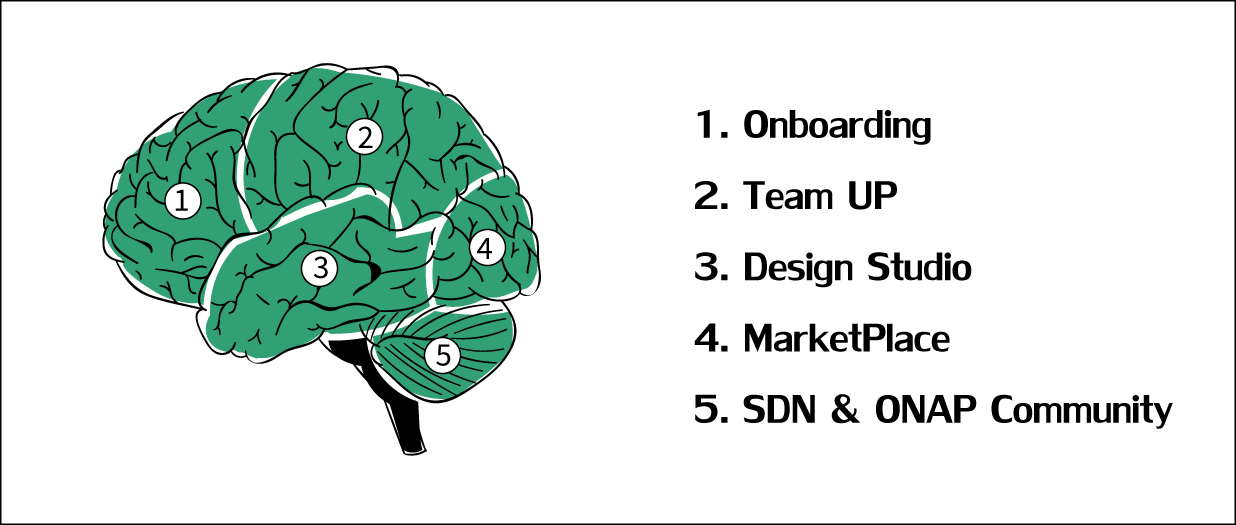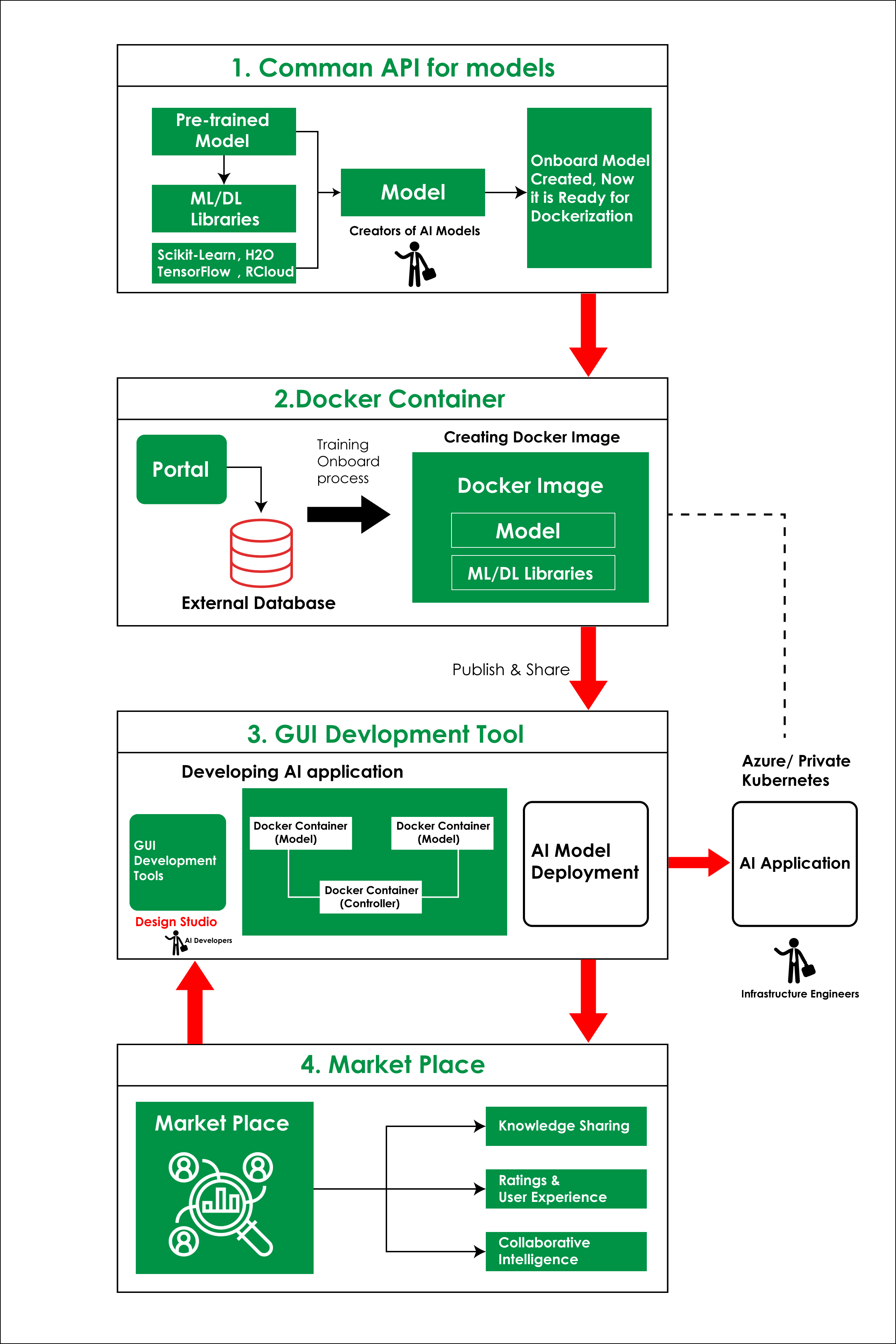ACUMOS: A New Innovative Path for AI
Last Updated :
03 Apr, 2024
Since last few years, Artificial Intelligence has gone from a science-fiction dream to a crucial part of our everyday lives. We use AI systems to interact with our mobiles through IoT devices like Siri and Alexa etc. Cars like Tesla integrated with AI, to find surroundings and enable automation in driving and in the same way there are a lot of technological areas that are going to impact future generations.
“Global annual spending on AI by retailers is estimated to reach $7.3 billion by 2022. source: Capgemini 79% of consumer products and 85% of retail companies intend to be using smart automation for supply chain management by 2021. source: IBM”
But the AI innovative path is initiated only in top leading companies like Microsoft, Google, Apple, and Facebook etc. Because we have a lot of difficulties in deploying AI applications. For example, there are no critical masses in areas of AI for networking and communication. Moreover, commercial deployments of AI are in the areas of image and speech processing, where research began three decades ago. Hence the development of AI systems will remain difficult. So here comes the Open-Source solution which helps to build AI applications more precisely called “ACUMOS”
What is ACUMOS?
The ACUMOS is an Open-Source AI platform co-developed by AT&T and TechMahindra, hosted by Linux Deep Learning Foundation. It is a great initiative to make Artificial intelligence applications easier to build, integrate and deploy. ACUMOS will help you in expediting the AI innovation, which return helps in revolutionizing the future.
How will it change the AI Space?
Previously we have so many popular AI frameworks that have been there to build AI apps. But unfortunately, the integration of AI apps developed using these frameworks is not an easy task for beginners, because it is totally involved with the cloud-based environment. Only the advanced programmers will do that. So ACUMOS AI consists of Design Studio based on Linux which helps you to integrate these frameworks with each other and it provides ease form of deployment for beginners.
ACUMOS Architecture
 ACUMOS provides full power to data scientists in order to publish creative AI models with custom integrated solutions. It is completely interoperable with any other ACUMOS AI models which are built regardless of any other AI frameworks. These models built with any other supportive and collaborative languages such as Java, Python, and R can also be developed, deployed and catalogued. ACUMOS contains five major modules, which plays a vital role in ACUMOS environment and ease the process of AI development in the ACUMOS ecosystem. Team UP: In this module, ACUMOS provides an open-source ecosystem for people to collaborate, experiment, and share their ideas and solutions to bring better outputs. Marketplace: Acumos brings AI into the mainstream of the marketplace and it also acts as go-to-site for making data-powered decisions. Moreover, it also makes AI an easy-to-use initiative in the design studio and marketplace. Onboarding: Due to the main focus on the interoperability, ACUMOS provides an enhanced support for diverse AI toolkits. Furthermore, many onboarding tools are available that include H2O, TensorFlow, generic Java, RCloud and so on to perform well. Design Studio: It is a graphical tool in the ACUMOS which is mainly designed for chaining, filters, multiple models and many more together into a particular solution like a run-time environment. This model can be used in different environments to solve different data sources and problems. SDN and ONAP: This is defined as a community to many marketplace solutions and can also be directly deployed into SDC. Steps to Create AI Models in ACUMOS based on Linux
ACUMOS provides full power to data scientists in order to publish creative AI models with custom integrated solutions. It is completely interoperable with any other ACUMOS AI models which are built regardless of any other AI frameworks. These models built with any other supportive and collaborative languages such as Java, Python, and R can also be developed, deployed and catalogued. ACUMOS contains five major modules, which plays a vital role in ACUMOS environment and ease the process of AI development in the ACUMOS ecosystem. Team UP: In this module, ACUMOS provides an open-source ecosystem for people to collaborate, experiment, and share their ideas and solutions to bring better outputs. Marketplace: Acumos brings AI into the mainstream of the marketplace and it also acts as go-to-site for making data-powered decisions. Moreover, it also makes AI an easy-to-use initiative in the design studio and marketplace. Onboarding: Due to the main focus on the interoperability, ACUMOS provides an enhanced support for diverse AI toolkits. Furthermore, many onboarding tools are available that include H2O, TensorFlow, generic Java, RCloud and so on to perform well. Design Studio: It is a graphical tool in the ACUMOS which is mainly designed for chaining, filters, multiple models and many more together into a particular solution like a run-time environment. This model can be used in different environments to solve different data sources and problems. SDN and ONAP: This is defined as a community to many marketplace solutions and can also be directly deployed into SDC. Steps to Create AI Models in ACUMOS based on Linux  There are four major steps have been involved in the AI development process on ACUMOS platform.
There are four major steps have been involved in the AI development process on ACUMOS platform.
- Creating and Onboarding Artificial Intelligence Applications In this step, we need to create AI applications with API and that applications are trained by different kinds of Machine Learning/Deep learning libraries such as TensorFlow, SciKit-Learn, RCloud, and H20.
- Dockerize the application and Register to Acumos AI Dockerizing an application is defined as a method of changing an application to run, debug, and test within a Docker Container. Although, this process is also involved in ACUMOS platform to Register AI apps into the ACUMOS environment. Dockerization makes use of environment variables and configuration files to create an environment-friendly application.
- Integrating and Sharing Knowledge Previously we have popular AI frameworks are available such as Tensorflow, SciKit-Learn, RCloud and H20. They are used to build AI applications very effectively. But their integration with each other framework is not possible individually. So the ACUMOS provides a platform for integration and sharing knowledge among different AI applications. The different AI applications will share their knowledge to produce better outputs.
- Share AI applications into Marketplace. Install developed AI apps in the Marketplace, which consists of both public and private modules. It also has infrastructure engineers to maintain the deployed AI apps.
- ACUMOS categorize the difference among the Machine Learning/Deep Learning libraries that are encased by common Application programming interface.
- Dockerization of AI applications provide easy development and deployment.
- ACUMOS GUI tool called Design studio that is used to develop visual programming code for AI applications.
- ACUMOS provides marketplace for sharing, rating, and collaborative intelligence with Artificial Intelligence models in both public and private places.
- Provides larger ecosystem for Artificial Intelligence.
- API connect, toolkits as microservices, and chain models.
- It provides an option to export AI applications in the form of Docker images to run in the private and cloud environments.
- It produces onboarding ramp for AI toolkits and ML models.
- Adding models with the tool kits is easy task with ACUMOS platform.
Like Article
Suggest improvement
Share your thoughts in the comments
Please Login to comment...